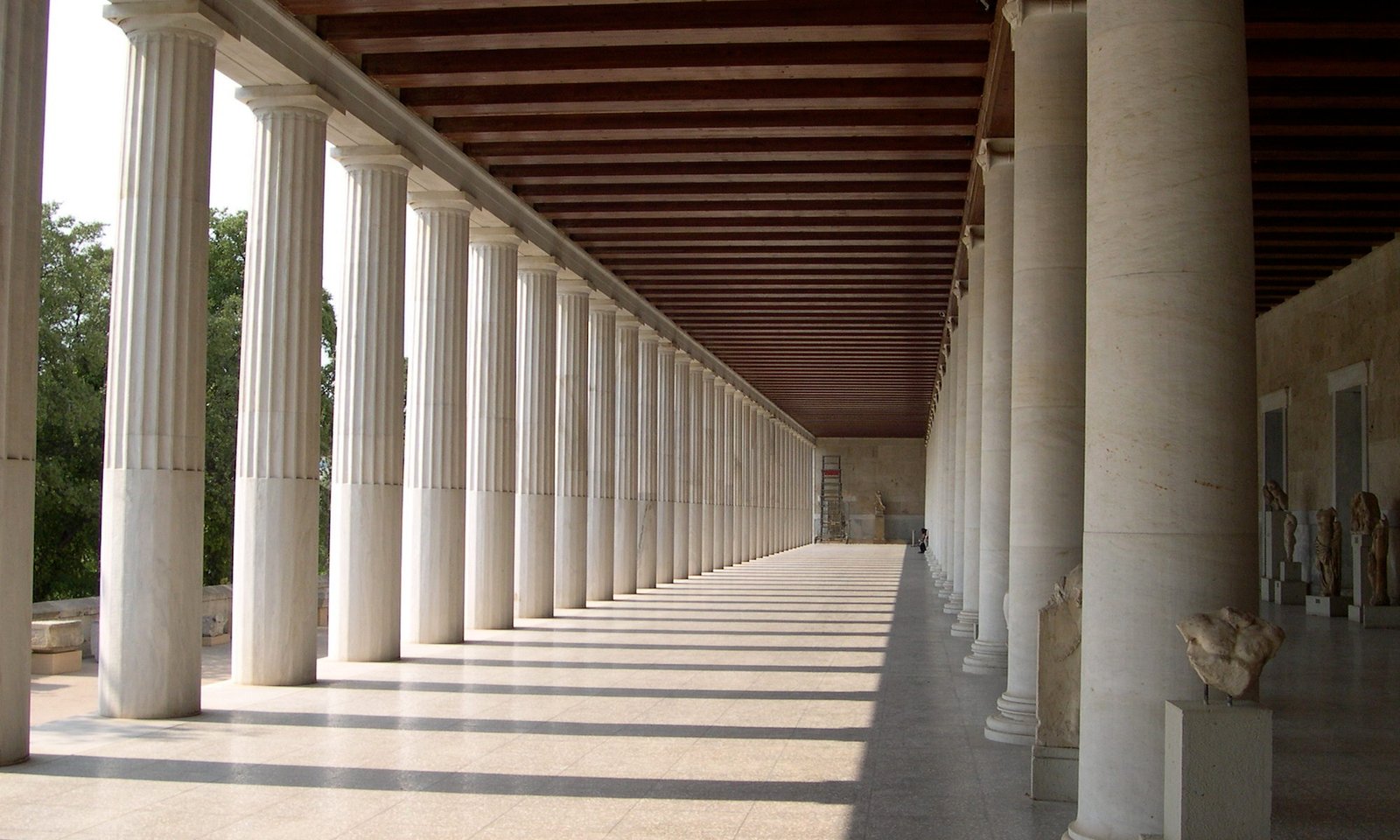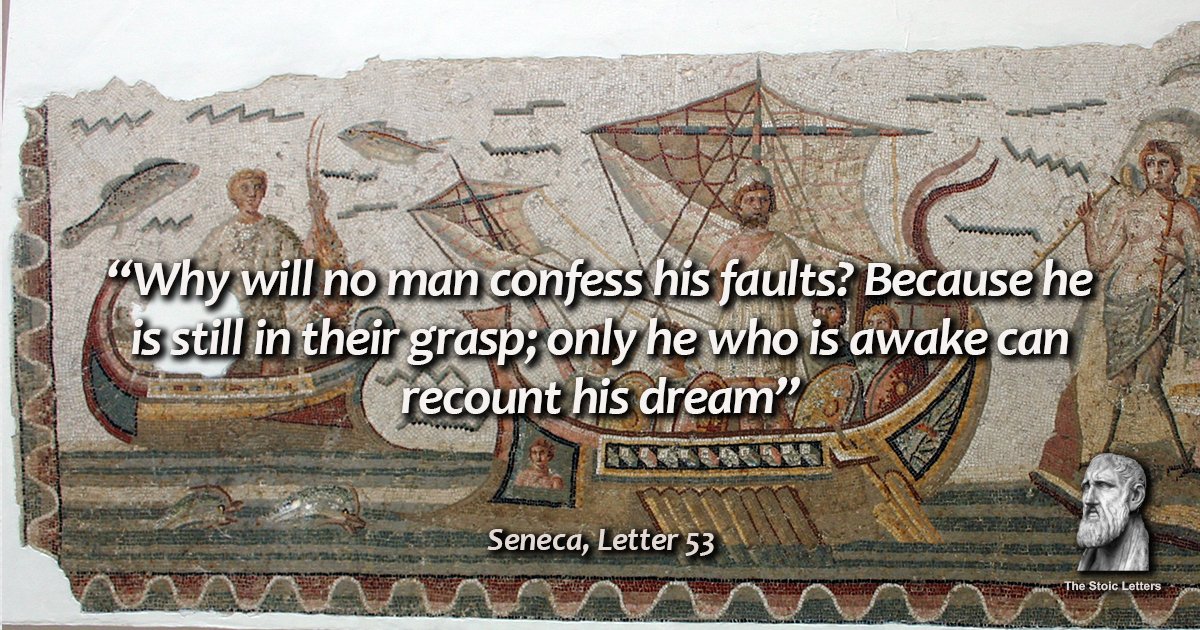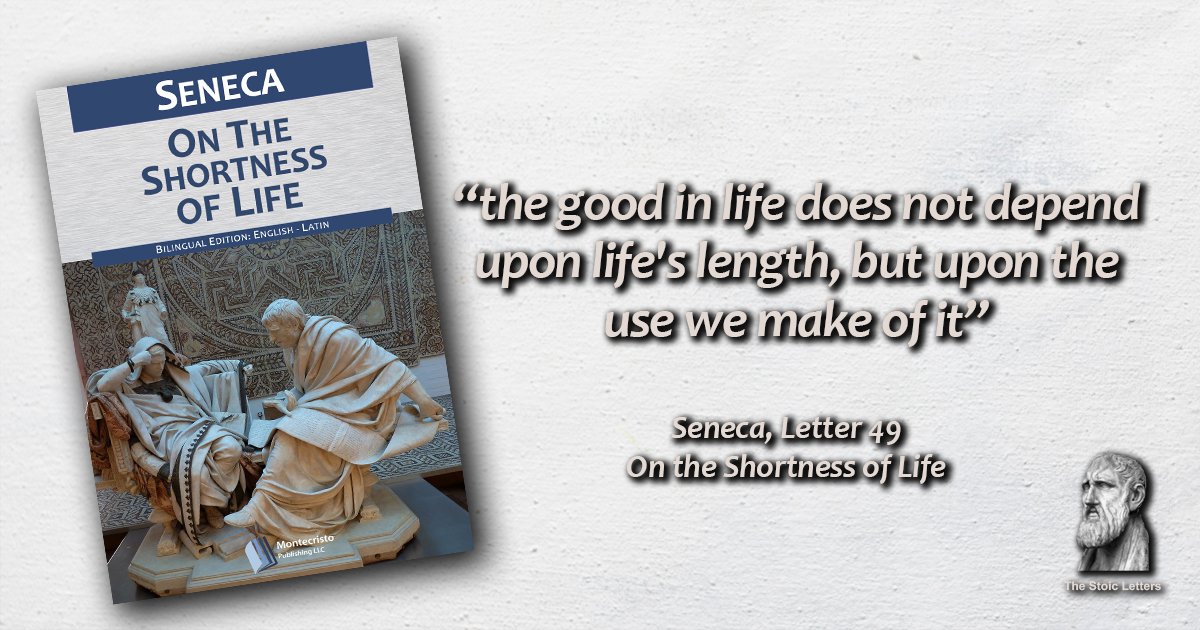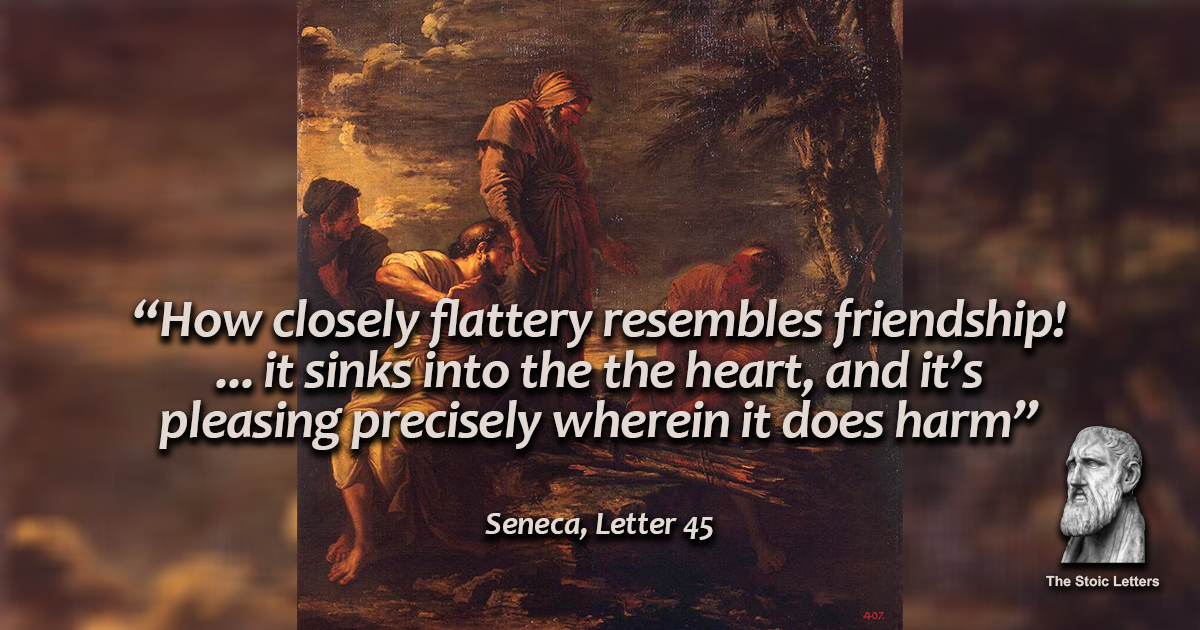In letter 53 Seneca uses a personal experience of a sea voyage to affirm that we easily overlook our faults, even those that constantly make themselves apparent:
“we forget or ignore our failings, even those that affect the body, which are continually reminding us of their existence, – not to mention those which are more serious in proportion as they are more hidden.” (LIII, 5)
Then he goes on to say that no one admits his faults “Because he is still in their grasp; only he who is awake can recount his dream, and similarly a confession of sin is a proof of sound mind. ” (LIII,8). A person suffering from physical illness quickly leaves business and clients aside and devotes himself to healing, however Seneca states that in the case of spiritual illnesses we do not do this and only devote ourselves to spiritual (philosophical) development when there is time in excess:
“Throw aside all hindrances and give up your time to getting a sound mind; for no man can attain it if he is engrossed in other matters. (LIII, 9)”
And what will be the reward for such an effort?
“a great distance will then begin to separate you from other men. You will be far ahead of all mortals, and even the gods will not be far ahead of you. Do you ask what will be the difference between yourself and the gods? They will live longer. … What a wonderful privilege, to have the weaknesses of a man and the serenity of a god!” (LIII, 11-12)
LIII. On the Faults of the Spirit
1. You can persuade me into almost anything now, for I was recently persuaded to travel by water. We cast off when the sea was lazily smooth; the sky, to be sure, was heavy with nasty clouds, such as usually break into rain or squalls. Still, I thought that the few miles between Puteoli and your dear Parthenope[1] might be run off in quick time, despite the uncertain and lowering sky. So, in order to get away more quickly, I made straight out to sea for Nesis,[2] with the purpose of cutting across all the inlets.
2. But when we were so far out that it made little difference to me whether I returned or kept on, the calm weather, which had enticed me, came to naught. The storm had not yet begun, but the ground-swell was on, and the waves kept steadily coming faster. I began to ask the pilot to put me ashore somewhere; he replied that the coast was rough and a bad place to land, and that in a storm he feared a lee shore more than anything else.
3. But I was suffering too grievously to think of the danger, since a sluggish seasickness which brought no relief was racking me, the sort that upsets the liver without clearing it. Therefore I laid down the law to my pilot, forcing him to make for the shore, willy-nilly. When we drew near, I did not wait for things to be done in accordance with Vergil’s orders, until
I remembered my profession[5] as a veteran devotee of cold water, and, clad as I was in my cloak, let myself down into the sea, just as a cold-water bather should.
4. What do you think my feelings were, scrambling over the rocks, searching out the path, or making one for myself? I understood that sailors have good reason to fear the land. It is hard to believe what I endured when I could not endure myself; you may be sure that the reason why Ulysses was shipwrecked on every possible occasion was not so much because the sea-god was angry with him from his birth; he was simply subject to seasickness. And in the future I also, if I must go anywhere by sea, shall only reach my destination in the twentieth year.[6]
5. When I finally calmed my stomach (for you know that one does not escape seasickness by escaping from the sea) and refreshed my body with a rubdown, I began to reflect how completely we forget or ignore our failings, even those that affect the body, which are continually reminding us of their existence, – not to mention those which are more serious in proportion as they are more hidden.
6. A slight ague deceives us; but when it has increased and a genuine fever has begun to burn, it forces even a hardy man, who can endure much suffering, to admit that he is ill. There is pain in the foot, and a tingling sensation in the joints; but we still hide the complaint and announce that we have sprained a joint, or else are tired from over-exercise. Then the ailment, uncertain at first, must be given a name; and when it begins to swell the ankles also, and has made both our feet “right” feet,[7] we are bound to confess that we have the gout.
7. The opposite holds true of diseases of the soul; the worse one is, the less one perceives it. You need not be surprised, my beloved Lucilius. For he whose sleep is light pursues visions during slumber, and sometimes, though asleep, is conscious that he is asleep; but sound slumber annihilates our very dreams and sinks the spirit down so deep that it has no perception of self.
8. Why will no man confess his faults? Because he is still in their grasp; only he who is awake can recount his dream, and similarly a confession of sin is a proof of sound mind. Let us, therefore, rouse ourselves, that we may be able to correct our mistakes. Philosophy, however, is the only power that can stir us, the only power that can shake off our deep slumber. Devote yourself wholly to philosophy. You are worthy of her; she is worthy of you; greet one another with a loving embrace. Say farewell to all other interests with courage and frankness. Do not study philosophy merely during your spare time.[8]
9. If you were ill, you would stop caring for your personal concerns, and forget your business duties; you would not think highly enough of any client to take active charge of his case during a slight abatement of your sufferings. You would try your hardest to be rid of the illness as soon as possible. What, then? Shall you not do the same thing now? Throw aside all hindrances and give up your time to getting a sound mind; for no man can attain it if he is engrossed in other matters. Philosophy wields her own authority; she appoints her own time and does not allow it to be appointed for her. She is not a thing to be followed at odd times, but a subject for daily practice; she is mistress, and she commands our attendance.
10. Alexander, when a certain state promised him a part of its territory and half its entire property, replied: “I invaded Asia with the intention, not of accepting what you might give, but of allowing you to keep what I might leave.” Philosophy likewise keeps saying to all occupations: “I do not intend to accept the time which you have left over, but I shall allow you to keep what I myself shall leave.”
11. Turn to her, therefore, with all your soul, sit at her feet, cherish her; a great distance will then begin to separate you from other men. You will be far ahead of all mortals, and even the gods will not be far ahead of you. Do you ask what will be the difference between yourself and the gods? They will live longer. But, by my faith, it is the sign of a great artist to have confined a full likeness to the limits of a miniature. The wise man’s life spreads out to him over as large a surface as does all eternity to a god. There is one point in which the sage has an advantage over the god; for a god is freed from terrors by the bounty of nature, the wise man by his own bounty.
12. What a wonderful privilege, to have the weaknesses of a man and the serenity of a god! The power of philosophy to blunt the blows of chance is beyond belief. No missile can settle in her body; she is well-protected and impenetrable. She spoils the force of some missiles and wards them off with the loose folds of her gown, as if they had no power to harm; others she dashes aside, and hurls them back with such force that they recoil upon the sender.
Farewell
Footnotes
- ↑ The poetical name for Naples; perhaps it was once a town near by which gave a sort of romantic second title to the larger city. Professor Summers thinks that this poetical name, together with tua, indicates a reference to a passage from the verse of Lucilius. Perhaps, however, tua means nothing more than “the place which you love so well,” being in the neighbourhood of Pompeii, the birthplace of Lucilius.
- ↑ An islet near the mouth of the bay wherein Baiae was situated. Puteoli was on the opposite side of the bay from Baiae.
- ↑ Aeneid, vi. 3. This was the usual method of mooring a ship in ancient times.
- ↑ Aeneid, iii. 277.
- ↑ Compare Ep. lxxxiii. 5.
- ↑ Ulysses took ten years on his journey, because of sea-sickness; Seneca will need twice as many.
- ↑ That is, they are so swollen that left and right look alike.
- ↑ Literally “on sufferance,” whenever other matters permit. Cf. Pliny, Ep. vii. 30 precario studeo, – “subject to interruption from others.”










